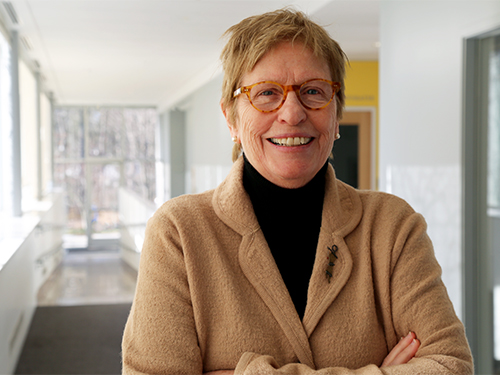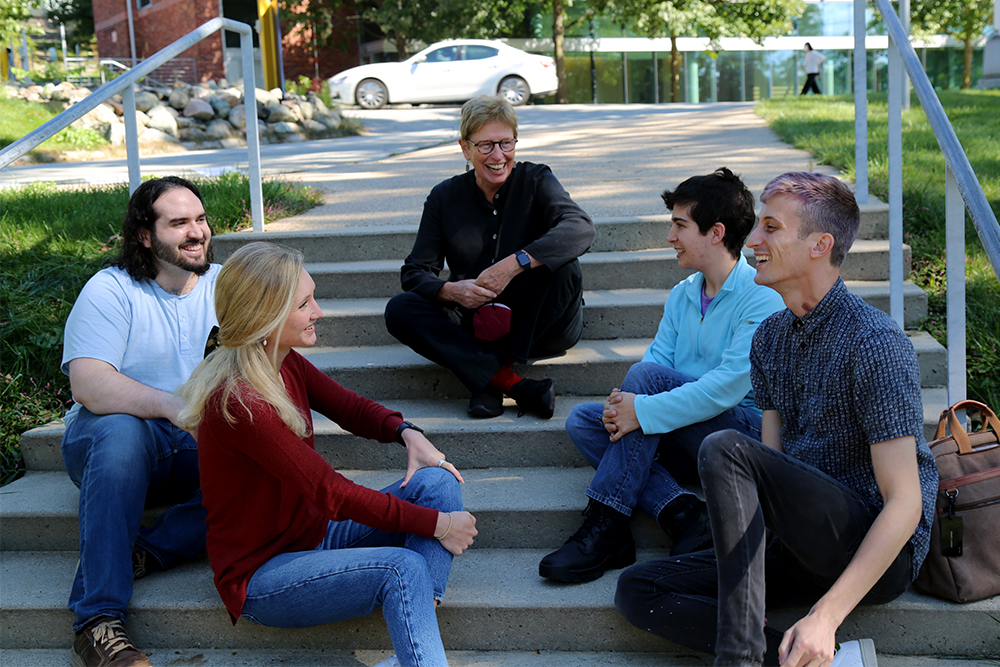
In 2021 the Master of Public Policy (MPP) program established a seventh concentration in Environmental Justice (EJ) which provides a combined social policy focus on issues of climate change and inequality. The concentration is chaired by Susan Curnan, Florence G. Heller associate professor of the practice and director of the Center for Youth and Communities. Curnan also teaches the concentration’s flagship course: “Environmental Justice and the Human Effects of Climate Change.”
Why are you excited to chair the new environmental justice concentration in the Heller MPP program?
This is not only exciting to me, but important and urgent. Climate change and inequality are the twin challenges of our time, and will largely define careers and the daily quality of life of our students and children in the coming decades. To study and act in the arena of environmental justice (EJ) is at the soul of the Heller School motto, "knowledge advancing social justice." Our job is to make that knowledge productive by preparing our students for policy and management careers that can address environmental policy impacts on the opportunities and wellbeing of poor and vulnerable populations.
There is a long and wretched history of environmental racism in this country (and around the globe), which climate change has deepened, broadened, and accelerated. Widespread public outrage and citizen leadership are fueling a new EJ movement, as Congress considers the most important series of climate-adjacent policy proposals in history. Climate change is a “threat multiplier,” bringing inequalities into sharp relief and making clear that those who are least responsible for its creation suffer the most from its effects.
The EJ concentration explores how human health, wellbeing, and life trajectories are inextricably linked to the health of the natural environment through the use of natural resources, the consequences of extracting those resources, and the impact on the air we breath, the water we drink, the food we eat, the green and blue spaces we enjoy and the overall quality and integrity of the ecosystem. I feel fortunate to have the opportunity to develop a vibrant learning community at Heller in this area.
Is 2021-2022 an inflection point for climate leadership and social justice to combine in environmental justice policy and politics? Have the COVID-19 pandemic and other challenges, including racial injustice, threats to our democracy, economic instability, growing disparities, and climate change, forced us to sharpen our focus on the vast environmental destruction and inequalities in our global communities? If so, what do we need to do to advance policy and action toward a world where environmental responsibilities, harms, burdens and benefits are shared in a fair and just way? These are among the urgent questions I am excited about working on with our EJ students in the coming months.

What makes this concentration at Heller unique?
The combined focus on inequalities and climate change in the name of environmental justice is Heller’s sweet spot. Human survival and sustainability of the planet depends on our collective success in realizing the climate change goals articulated in the Paris Agreement, the most recent UN climate report, and other seminal documents, while addressing related public health challenges. I like to remind us that "there is no Planet B."
When I studied at the Yale School of the Environment during the first wave of the environmental movement, we only studied the scientific aspects of climate and ecology. There was only one sociology course offered at the school in those years. Many graduate schools still address the science and the social justice issues separately. The genius of the Heller School is that we know the answer, complex to be sure, is in the combination.
What do you see as the most impactful ways that Heller students can contribute to the environmental justice movement?
First, as informed, educated citizen leaders with high-level communication skills and competencies to engage a wide range of people in the EJ movement. This especially includes those whose voices have not really been heard, who may be distrustful of the government, or who have a hard time connecting global warming as a threat to their daily lives. Communication across cultures and socioeconomic boundaries is imperative. To date, most major climate reports have been written for scientists and academics, which limits access, understanding and engagement for the public.
Second, as an MPP concentration, I expect our students to be super-engaged in policy scanning, development and analysis with an environmental justice lens. They’re also leaders in management, and producers and consumers of research. Some of our graduates are already working in the field and will be visiting with our EJ class to share their experience and begin the networking so critical to the Heller experience.
Can you tell us a little bit about your course, “Environmental Justice and the Human Effects of Climate Change”?
To study environmental justice and the human effects of climate change is to study historical and continuing environmental harms that have disproportionately affected communities of color in the United States and around the world, and to consider what blend of science, policy, advocacy, and leadership it takes to ensure the fair distribution of environmental benefits and burdens.
The course is interdisciplinary by nature. We study at the intersections of environmental justice history, climate science, ecology, poverty, race and gender inequity (climate change is not gender-neutral, as women suffer the most), and public health. The majority of the course readings are authored by women and people of color, and include climate scientists, investigative journalists, engineers, technologists, community and social justice activists, civic leaders, poets, artists, policy makers, lawyers, economists, financial investors, historians, and medical professionals.
We focus on problems and solutions. Extreme weather events and patterns of heat waves, rising sea levels, raging unprecedented wildfires, outrageous floods, droughts, new global diseases thriving in warmer climates, toxic water, polluted air, are all linked to climate change caused by human behavior. The latest in a series of UN climate change reports used the word "unequivocal" for the first time to define the link between human behavior/exploitation and climate change.
One of the assignments is for students to produce a photo-text exhibit called "eyes wide open." Students create 6 slides over the semester depicting environmental injustice and/or innovations witnessed in their daily lives. In December we will hold an exhibit for the Heller School — an awakening experience for gallery-goers!
The course is highly interactive in terms of student engagement. I call the course design a “co-venture” in teaching and learning. There is no "sage on the stage” since no one knows it all; this field is very dynamic and needs all of our input every day. There is very little lecture, I place more value on reading analysis and discussion leadership. After just four class sessions I am already impressed with the students’ breadth and depth of insight, commitment, and responsibility as learning partners.
